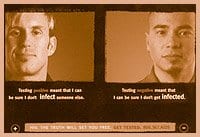South of the border they’re using flashy ad campaigns and cold hard cash to get people tested for HIV, but here in Canada the promotion of testing appears to be on the back burner.
“It is my impression that the United States has identified testing as a high priority from a national point of view and Canada hasn’t really taken that step,” says Dr Michael Rekart of the British Columbia Centre For Disease Control’s Sexual Transmitted Diseases Branch.
The Ontario government has no present campaigns underway to promote HIV testing. They’re satisfied with the way that the word has got out to people through their family doctors and various health centres which advertise their services.
“We’re happy that 20 percent of the population has come in to get their HIV test and people continue to get their tests done on a regular basis,” says Dan Strousbourgh, spokesperson for the Ontario Ministry Of Health And Long-Term Care.
Despite the number of people getting tested for HIV in Ontario, there are still many who may be unaware of their status. A study published in May 2001 by Health Canada’s Centre For Infectious Disease Prevention And Control claims that up to one third of all people infected with HIV are unaware of their status.
A study by the US Centers For Disease Control And Prevention, presented at International AIDS Conference in Barcelona, Spain this summer, suggested that 10 out of 100 young gay US men have HIV and 80 percent of those don’t know they have it. The study looked at 5,719 young gay and bi men interviewed between 1994 and 2000.
In many US cities, the focus is increasingly on getting people to find out their status.
“Testing is a priority in San Francisco because we have had an increase in new HIV infections over the last two years,” says Steven Tierney, director of HIV prevention at the San Francisco Department Of Public Health. “And it is important for us to design and deliver messages to folks based on harm reduction, by which we mean we want folks to identify the risk and take action to reduce their risk.”
San Francisco – which estimates that it will have 1,080 new infections this year – has a new flashy ad campaign entitled The Truth Will Set You Free. The $300,000US TV and print campaign is aimed at getting people tested.
Elsewhere in San Francisco, the Tenderloin AIDS Resource Centre (which services a population with a high rate of homelessness) recently offered $10 to clients who got tested and picked up their results.
The Centers For Disease Control And Prevention in Atlanta recently recommended for the first time that all sexually active gay and bisexual men get tested once a year for HIV.
By contrast, the Toronto Department Of Public Health has no present campaigns or planned campaigns to promote testing.
Early detection of the HIV virus help in the treatment of HIV related illness and Tierney says it also changes behaviour.
“It certainly affects some people’s behaviour,” says Tierney. “I think the studies that you will find tell you that a good number of people knowing their status increases the likelihood that they will protect themselves and their partners.”
The message of San Francisco’s ad campaign seems to differ from campaigns like the Condom Country campaign here in Toronto and Vancouver’s new Condoms Or Cocktails campaign. Both focus on the use of condoms for prevention.
While the use of condoms for high risk behaviours – like fucking – are still a big part of San Francisco’s prevention strategy, Tierney says they also operate from the point of view that condoms aren’t going to be used all the time.
“We operate on a risk reduction model here which acknowledges that people are engaged in certain behaviours and hopes to help them identify risk and develop strategies for reducing their risks,” says Tierney.
The change in behaviour isn’t something that Toronto’s Rekart is convinced of.
“I would be very surprised if there was a hugely significant large body of literature that showed a very dramatic change in behaviour just based on testing,” says Rekart.
He says that the British Columbia Centre For Disease Control will be involved in surveying gay men in that province throughout the summer to see what gaps need to be filled, but is skeptical that testing will come out as a priority.
“It’s an important issue but is it important enough to redirect money from elsewhere? Is it important enough to put in new money? Are there more important things to focus on? It’s a sort of balancing question,” says Rekart.
“I think the States believes that it is a really critical issue and I don’t think anyone in Canada is that strong on it.”

 Why you can trust Xtra
Why you can trust Xtra


